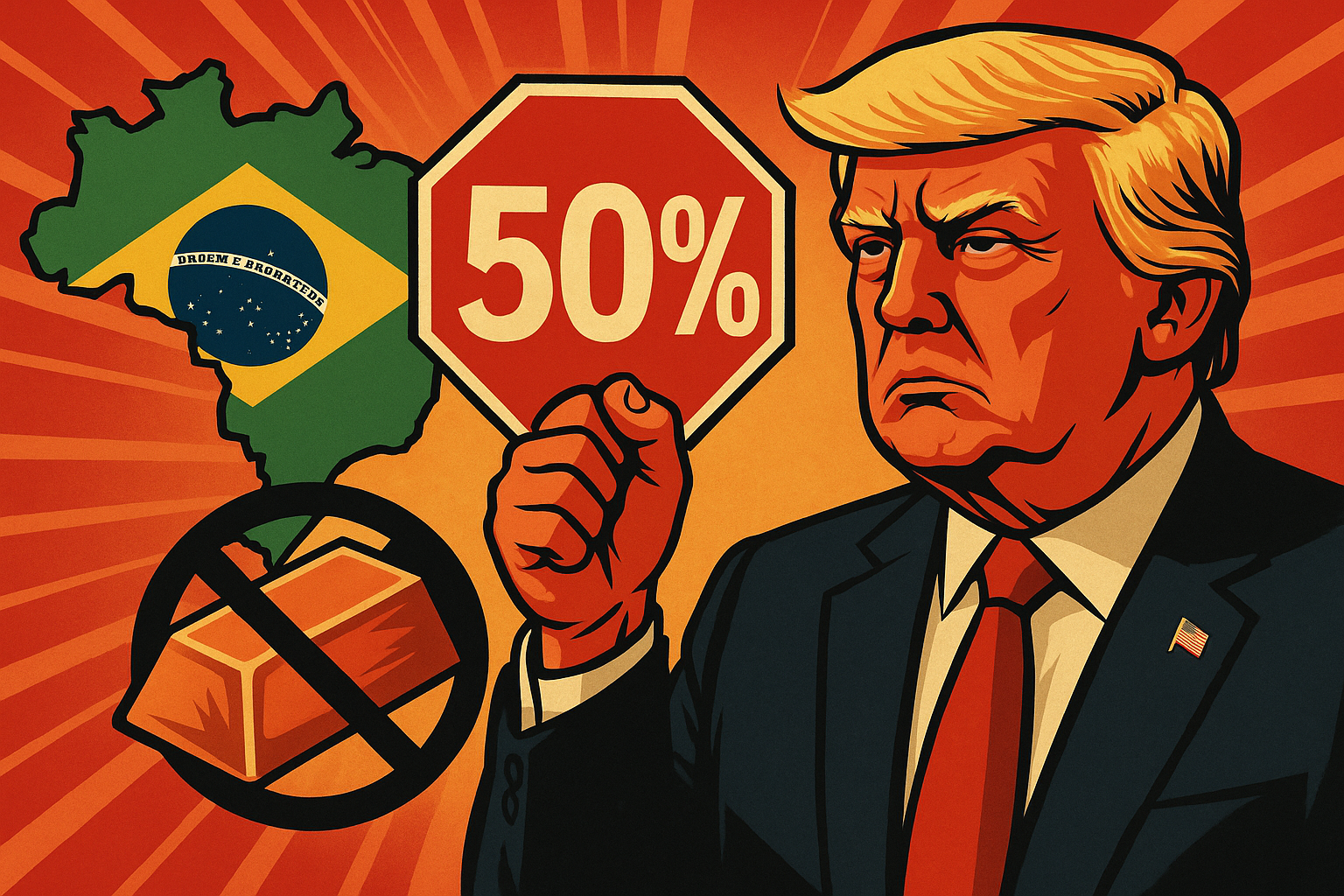As Global Markets Watch Anxiously, Fresh Tariffs on Brazil and Copper Threaten to Reignite Inflation and Supply Chain Shocks
Investors were hit with a wave of uncertainty this morning after former U.S. President Donald Trump unveiled a sweeping 50% tariff on Brazilian imports—including copper—set to take effect August 1. The announcement, coupled with new trade discrepancy letters issued to Sri Lanka and other nations, has jolted commodity markets and raised serious concerns about a potential return to protectionist policies just as global inflation appeared to be cooling.
Copper futures surged in early trading, while mining stocks and Brazilian equities faced heightened volatility. The renewed trade war rhetoric marks one of the most aggressive moves by Trump in his ongoing campaign narrative and is triggering déjà vu for investors still recovering from the 2018–2019 trade turmoil.
Why This Move Is Making Investors Nervous
At the heart of the announcement is a 50% tariff aimed at curbing imports of Brazilian copper and other industrial goods, citing what Trump described as “unfair trade advantages.” According to The Wall Street Journal and Reuters, the administration’s rationale focuses on “restoring trade balance” and protecting U.S. industrial capacity—especially in the energy transition sectors that depend on metals like copper.
Brazil, one of the world’s top 10 copper exporters, supplies the U.S. with significant quantities used in EV batteries, data infrastructure, and green energy systems. Analysts warn this move could squeeze already tight global copper supplies, intensifying price pressures.
In parallel, discrepancy letters were issued to countries including Sri Lanka, a tactic used to signal possible future sanctions or trade restrictions. Markets read this as a signal of broader trade friction on the horizon.
“This is a clear warning shot to global markets that tariffs are back on the table,” said Marc Chandler, Managing Director at Bannockburn Global Forex. “It’s inflationary, disruptive to supply chains, and bullish for commodities—at least in the short term.”
Commodity Shockwaves and Sector Impacts
Following the announcement:
- Copper prices jumped over 3% on the London Metal Exchange.
- Shares of major U.S. copper producers like Freeport-McMoRan (FCX) rallied in premarket trading.
- Brazilian ETF EWZ dropped 2.4%, reflecting investor concern over export impact.
- U.S. industrials and green energy companies saw mixed reactions, with some manufacturers facing cost concerns.
Energy transition sectors—ranging from EV producers to renewable energy developers—could face margin compression if raw material costs rise, potentially stalling key infrastructure projects.
Meanwhile, the move may embolden protectionist policy stances globally. “We’re already seeing chatter from Brazil’s Ministry of Trade about potential retaliatory measures,” reports Business Standard.
Future Trends to Watch
With inflation rates stabilizing globally, any shock to commodity supply chains could reignite price volatility—especially for metals critical to infrastructure, semiconductors, and clean tech. Copper, often considered a proxy for global economic health, is particularly vulnerable.
Analysts at Goldman Sachs recently reaffirmed copper’s “structural bull market” due to growing demand from AI data centers and clean energy, setting a 2026 price target of $15,000/tonne. If trade frictions deepen, that bullish trajectory could accelerate.
Also notable is the potential shift in sourcing strategies. U.S. firms may look to diversify copper imports toward Chile or Canada, potentially realigning trade flows and investment decisions across Latin America.
Key Investment Insight
Investors should brace for near-term volatility in commodity markets and related equities. Copper producers, metals ETFs (such as CPER or PICK), and inflation hedges may benefit. On the flip side, sectors reliant on industrial metals—especially clean tech and EVs—may see cost headwinds.
Monitoring supply chain policy, Latin American political response, and central bank commentary on inflation expectations will be critical in the coming weeks.
Stay ahead of geopolitical risk and market-shaping headlines with daily insights from MoneyNews.Today—your trusted source for smart investor intelligence.





